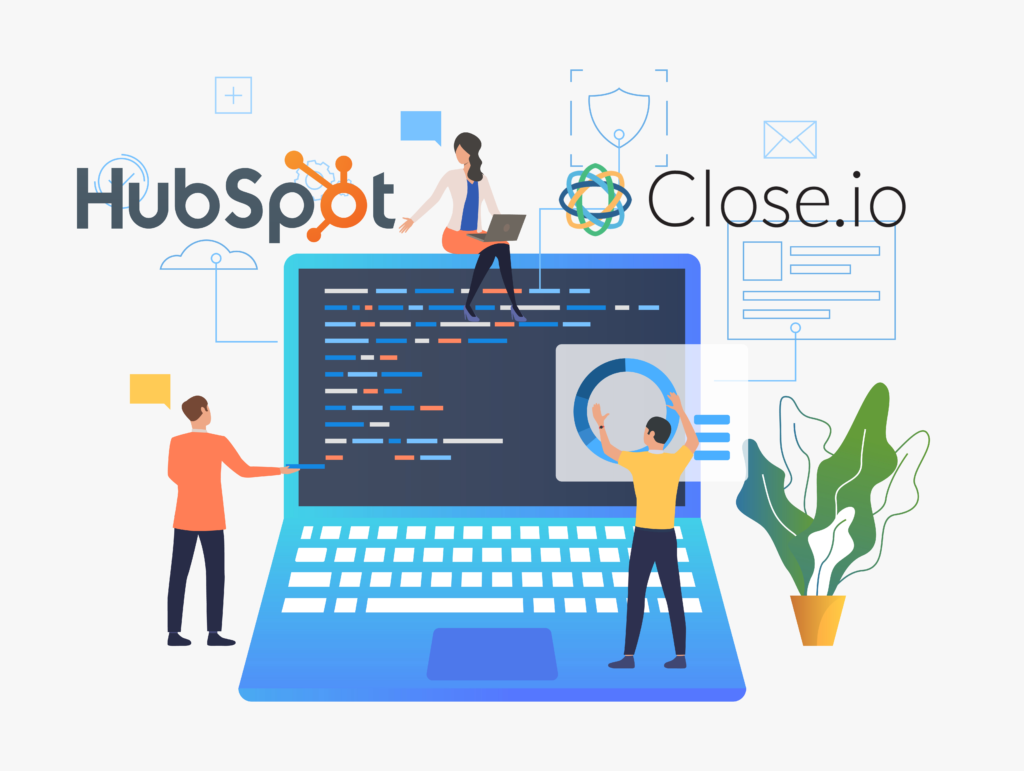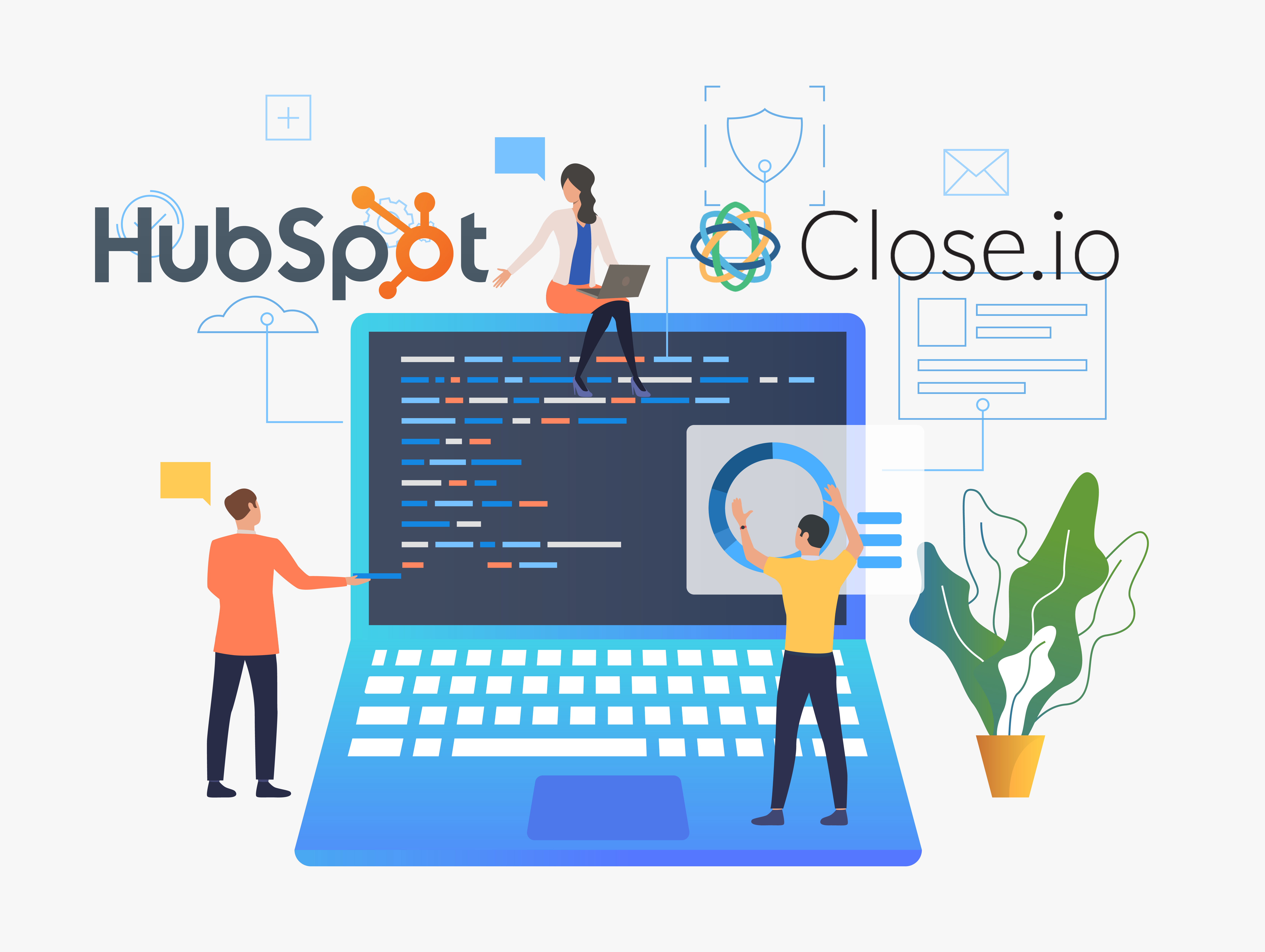As businesses grow and customer bases expand, managing customer relationships becomes more complex. Sales teams need tools to manage customer interactions and maintain an overview of their pipeline. In recent years, two popular tools have emerged: HubSpot and Close. In this article, we will explore the differences between HubSpot vs Close and help you determine which one is best suited for your business.

What is HubSpot?
HubSpot is an all-in-one marketing, sales, and service platform that provides companies with the tools they need to manage their customer relationships. The platform includes a wide range of features, including lead generation tools, customer management tools, email marketing, and more.
What is Close?
Close is a sales engagement platform that helps businesses manage their sales process more efficiently. The platform includes a range of features such as email management, task management, call tracking, and more.
HubSpot vs Close: Features
Both HubSpot and Close have a range of features designed to help businesses manage their customer relationships. Here are some of the key features of each platform:
HubSpot:
Marketing automation tools
Sales automation tools
Customer relationship management (CRM) tools
Email marketing
Landing page builder
Lead management and scoring
Social media management
Analytics and reporting
Integration with third-party apps
Close:
Sales automation tools
Email management
Task management
Call tracking
Sales reporting and analytics
Lead management and scoring
Integration with third-party apps
HubSpot vs Close: Pricing
Pricing is an important consideration when choosing between HubSpot and Close. Here is a breakdown of the pricing plans for each platform:
HubSpot:
Free: Basic CRM, forms, live chat, email marketing, ads management, and more.
Starter: Starts at $45/month, with more features than the Free plan, including email tracking, meeting scheduling, and contact management.
Professional: Starts at $450/month, with more advanced features such as automation workflows, reporting dashboards, and more.
Enterprise: Starts at $1,200/month, with all features included, along with advanced reporting, custom event tracking, and more.
Close:
Basic: Starts at $25/month per user, with email management, basic reporting, and more.
Professional: Starts at $65/month per user, with more advanced features, including call tracking, lead management, and reporting.
Business: Starts at $145/month per user, with all features included, including custom reporting, API access, and more.
HubSpot vs Close: User Experience
User experience is another important consideration when choosing a sales engagement platform. Here is an overview of the user experience for each platform:
HubSpot:
User-friendly interface
Customizable dashboard
Easy navigation
Training and support resources available
Mobile app available
Close:
Clean interface
Easy to use
Robust search functionality
Training and support resources available
Mobile app available
HubSpot vs Close: Integrations
Both HubSpot and Close integrate with a range of third-party apps, allowing businesses to customize their sales engagement platform. Here are some of the integrations available for each platform:
HubSpot:
Salesforce
Google Analytics
Microsoft Dynamics
Close:
Salesforce
Trello
Slack
Google Calendar
HubSpot
Which Platform Should You Choose?
Choosing between HubSpot and Close depends on the unique needs of your business. Here are some factors to consider:
Size of your business: HubSpot is a more comprehensive platform, making it better suited for larger businesses with complex sales processes. Close is better suited for small to mid-sized businesses
Budget: Both HubSpot and Close have a range of pricing plans, so it’s important to consider your budget when choosing a platform.
Features needed: Consider the specific features you need for your business. If you need marketing automation and social media management, HubSpot is the better choice. If you need call tracking and task management, Close is the better choice.
User experience: Both platforms offer user-friendly interfaces and training and support resources, so choose the one that you find most intuitive and easy to use.
Integrations: Consider the third-party apps that your business already uses and choose a platform that integrates with them.
Both HubSpot and Close are powerful sales engagement platforms that can help businesses manage their customer relationships more efficiently. The choice between the two depends on your specific needs, budget, and the features you require. Take the time to evaluate both platforms and choose the one that is best suited for your business.
Other Alternative
Simply CRM is a cloud-based customer relationship management (CRM) software that is designed to help businesses manage their customer relationships and sales processes. It offers a range of features and tools that can help businesses streamline their sales processes, track customer interactions, and improve customer engagement.
One of the key features of Simply CRM is its contact management tools. The software allows businesses to store all of their customer information in one central location, making it easy to access and update customer records as needed. Businesses can also segment their customer database based on various criteria, such as demographics, purchase history, and engagement level, allowing them to target specific groups with personalized marketing campaigns.
Simply CRM also offers sales pipeline management tools that allow businesses to track their sales processes from start to finish. The software provides a visual pipeline view of all open deals, allowing businesses to see where each deal is in the sales process and identify potential bottlenecks. This can help businesses prioritize their sales activities and focus on deals that are most likely to close.
In addition to its sales pipeline management tools, Simply CRM also offers marketing automation tools that can help businesses streamline their marketing processes. The software allows businesses to create and send email campaigns, track website visitors, and monitor social media engagement, all from within the platform. This can help businesses improve their customer engagement and drive more leads and sales.
Simply CRM also offers a range of other features, including task management tools, team collaboration tools, and reporting and analytics tools. The software is designed to be easy to use, with a simple and intuitive user interface that requires no technical expertise. It also offers a range of integrations with other popular business tools, such as Zapier, Mailchimp, and QuickBooks.
Overall, Simply CRM is a powerful and versatile CRM software that can help businesses of all sizes manage their customer relationships and sales processes more effectively. Its range of features and intuitive user interface make it a popular choice for businesses looking to improve their customer engagement and drive more sales.




